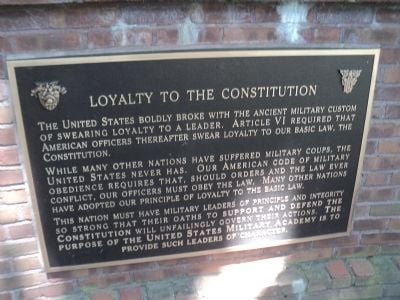A Tribute to Doug Letter
In both the runup to and in the wake of Donald Trump’s election as President, I spent a lot of time counseling career Justice Department attorneys—along with people contemplating jobs at the department—about what to do. As I wrote the other day, one assistant U.S. attorney literally sat in my office and told me that he was going to resign because “I don’t want to stand up in court any more and say ...
In both the runup to and in the wake of Donald Trump’s election as President, I spent a lot of time counseling career Justice Department attorneys—along with people contemplating jobs at the department—about what to do. As I wrote the other day, one assistant U.S. attorney literally sat in my office and told me that he was going to resign because “I don’t want to stand up in court any more and say ... I represent the United States.” I helped talk that person out of immediate resignation, though a year later, he no longer works for the Justice Department. Some of this career counseling took place in public: People started writing me letters asking what the ethical course to take looked like. In all cases, I urged people in career positions to remain in place, and I urged people contemplating career-level service at the Justice Department who were antsy about showing up for work the first day to do so. There is a place, I believed and still believe, for honorable service in the Trump administration.
In the back of my head as I responded to these letters and had these conversations was a man named Doug Letter. Doug, for almost the entirety of my professional career, has been a leader of the Civil Appellate staff at the Justice Department. I met him when I was a cub reporter at Legal Times in the mid-1990s. We have never been close but always been friendly. He is the kind of institution at the department that every administration—Republican and Democratic alike—has relied on for zealous advocacy in tough and politically unpopular appellate cases and for quiet counsel on how to stay on the right side of the law.
When I first met him, he was just off a detail to the White House counsel’s office in Bill Clinton’s White House. Such was his reputation within the department that notwithstanding that service, the Bush administration made him a point person on its highest-stakes, post-9/11 national security litigation. During that period and into the Obama administration, he served as a special Terrorism Litigation Counsel and Appellate Litigation Counsel. He defended a lot of policies that many people found deeply objectionable—and always did it with good cheer and a respect for opposing counsel and arguments. There is nobody in the department who better represents apolitical service of the highest quality over time.
Yesterday, Doug’s former deputy, Lawfare contributor Bob Loeb, announced on Twitter that Doug was leaving the Justice Department. He tweeted the following:
Doug Letter stepping down as Director of Civil Appellate at DOJ. pic.twitter.com/0WY1hlviL7
— Bob Loeb (@BobLoeb) January 2, 2018
Leaving DOJ. Joing @GeorgetownLaw where he will be a Visiting Professor and Senior Litigator at the Institute for Constitutional Advocacy and Protection.
— Bob Loeb (@BobLoeb) January 2, 2018
Appellate lawyer John Elwood responded: “This is big news. Doug is an institution.”
Elwood is right. Here was my reaction:
This is a very big deal—and a very sad thing. Doug Letter has run this office for a long time. He is an institution guy who has represented administrations of both parties through some of their toughest litigations. It says worlds that he won’t be representing this one any more. https://t.co/U6u5GRr90Q
— Benjamin Wittes (@benjaminwittes) January 2, 2018
And here was the reaction to that:
Doug Letter personifies what is best about the Justice Department and at the same time is typical of DOJ lawyers: dedicated, smart and sacrificed to serve his country. Thank you for your service Doug. Job well done. https://t.co/j6ZTTZkgdR
— Eric Holder (@EricHolder) January 3, 2018
Isn't this the truth? An exemplar of public service. There're armies of thousands who have had the privilege of working with Doug. I'm thrilled I'll be able to do so again at GULC. https://t.co/iF4qVHrnPp
— Marty Lederman (@marty_lederman) January 3, 2018
Doug is heading to Georgetown Law’s Institute for Constitutional Advocacy and Protection (ICAP), which announced his move as follows:
Letter will serve as senior litigator from practice at ICAP, which has both spearheaded and supported a variety of high-impact litigation since its launch in August.
“We are very excited to welcome Doug to an ICAP leadership team rich in high-level government experience,” said Georgetown Law Visiting Professor Joshua Geltzer, ICAP’s executive director. “Doug will instantly bolster ICAP’s mission to use the power of the courts to uphold constitutional rights and values."
Letter will also serve as visiting professor at Georgetown Law, where students have the opportunity to participate in ICAP’s litigation and other strategic legal advocacy efforts. To date, these have included filing suit on behalf of the City of Charlottesville against militia and white nationalist groups that engaged in illegal paramilitary activities at last summer’s deadly rally there, as well as challenging practices such as state anti-sanctuary city policies and money bail systems that result in the detention of thousands of poor defendants solely because of their inability to pay.
At ICAP, Letter will hold the same titles as former Justice Department colleague Mary McCord, who previously served as acting assistant attorney general and principal deputy assistant attorney general for national security. ICAP’s executive director Joshua Geltzer also held high-level national security positions at the Justice Department and White House, while ICAP’s faculty chair, Georgetown Law Professor Neal Katyal, previously served as acting solicitor general and is currently litigating the State of Hawaii’s challenge to the Trump administration’s travel ban, although not under the auspices of ICAP.
I have not spoken to Doug about why he is leaving, but I take Loeb very seriously when he says both that Doug is not one to jump ship blithely—which is clearly true—and that “I have to believe that politicization of DOJ made this decision easier for him.”
The Civil Appellate staff has had a rough year under Trump. It has been embroiled in defending the travel bans. It has also had to defend the administration in its efforts to prevent underage immigration detainees from having abortions—and then had to stand by while the solicitor general’s office went after opposing counsel. In such situations, one of the jobs of the head of that office—which has a longstanding policy of letting lawyers not handle cases over which they have conscience objections—is to make sure cases are reasonably staffed. Coralling appalled lawyers into cases they don’t want to handle can’t be an easy way to have spent the last year. Moreover, the solicitor general's office’s behavior in the abortion case suggests to me that the role has likely involved some unpleasant managing of the political echelon as well. All of this is, to be sure, the job of the head of Civil Appellate. But it doesn’t sound like a very fun job. And I can certainly understand why Letter might prefer litigation against the government on matters of democratic importance.
So to Letter, congratulations on an exceedingly admirable career and on the next chapter of it.
And to the many young lawyers whom I have been advising, with Doug in mind, that there is a place for honorable service at the career level, yes, there still is such a place. But that place is undeniably narrower and less comfortable than it used to be. And like Loeb, I strongly suspect—though I don’t know for sure—that Doug’s departure reflects, among other things, that narrowing.


.png?sfvrsn=48e6afb0_5)


